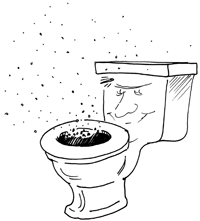STRANGE BUT TRUE- Germophobes, beware: Your toilet spews nasty clouds

DRAWING BY DEBORAH DERR McCLINTOCK
Q. Do germophobes have good reason to worry over a toilet flush? –K. Robbins
A. Don't tell 'em, but the maelstrom of down-rushing water creates a top layer of airy froth, so light it rises in a fine mist of droplets buffeted about in the air, says David Bodanis in The Secret House. Cocooned inside are viruses and bacteria recently emerged from the human lower digestive tract, up to 500,000 of these pathogenic droplets after an ordinary flush.
Soon the microbes settle on the floor, cabinets, sink, toothbrushes, walls. "Almost all have no problem going into suspended animation and surviving for up to 11 days as the transporting water bubble around them dries away," says Bodanis.
Q. When are diamonds a left-hander's best friend? –W. Ford
A. When they're baseball diamonds, says Washington University in St. Louis engineering professor David Peters. Just look at the numbers. While only 10 percent of the population is left-handed, 25 percent of major leaguers are. Of the 61 pitchers enshrined in the National Baseball Hall of Fame, 13 are left-handed, or 21 percent, more than twice that in the general population. It's even more striking for position players: of 138 in the Hall, 71 are righties, 59 are lefties, and eight are switch-hitters– or close to 50-50! Among left-handers are some of the game's greatest: Babe Ruth, Ty Cobb, Ted Williams, Stan Musial, George Brett, Barry Bonds.
Why such a tilt? Most important is that left-handed batters get a better look at the pitch from a right-hander, since that hand is hurling from an angle more straight-on to their eyesight. A right-handed batter, on the other hand, sees the ball coming from over his shoulder, the reason batters switch-hit.
Then there's running to first base: When a right-hander swings, his momentum carries him the wrong way toward third base; a lefty already stands some five feet closer to first, with his swing and spin carrying him in the correct direction. So a lefty gets to first base about 1/6th of a second faster, translating into more hits and a higher batting average. For lefty pitchers on the mound, they stand automatically facing a runner on first, making a pickoff far easier.
It's almost as if the game were designed to make a lefty the "Natural," concludes Peters.
Q. Shake the hand of a blind person, and in what sense does your own hand become an open book? –H. Keller
A. The sensitivity of human fingertips is remarkable, and particularly so in people who have lost their eyesight for a long time, allowing them to feel details of texture and subtleties of form that escape the sighted, says Nina Jablonski in Skin: A Natural History. This happens because the part of the brain normally given over to interpretation of visual information becomes recruited for touch and hearing, helping the long-term blind read Braille quickly.
You can think of their hands as expert "observational instruments." Thus your handshake will be read in exquisite detail by digital pads containing receptors especially attuned to light touch (Meissner's corpuscles), constant pressure (Merkel's corpuscles), deep pressure and vibrations (Pacinian corpuscles), temperature (Ruffini corpuscles– were you holding a hot drink?) and of course pain (free nerve endings– don't squeeze too hard!).
Q. What's the best guarantee in life for having a dream come true? –C.D. Rella
A. If it's your dream, you're the guarantee, via the classic self-fulfilling prophecy. Dreams can color your thinking about upcoming plans and your closest friends, especially if nighttime reveries mirror what you already believe, says Bruce Bower in "Nighttime Thoughts See Light of Day" in Science News. People in cultures as diverse as the U.S., India, and South Korea generally assume that dreams contain hidden truth, say Carey Morewedge of Carnegie-Mellon University and Michael Norton of Harvard. In fact, many dreamers feel that these provide more meaningful insight than do comparable waking thoughts.
In one experiment, participants reported feeling closer to a friend after imagining a dream in which the friend defended them, versus betrayed them. Explains Morewedge: A person who dreams about a loyal friend may then act in ways that encourage the friend to behave loyally. "The dreams most likely to affect our daily lives and relationships are the ones that accord with our existing beliefs and desires," Bower says.
~
Send Strange questions to brothers Bill and Rich at [email protected].
#